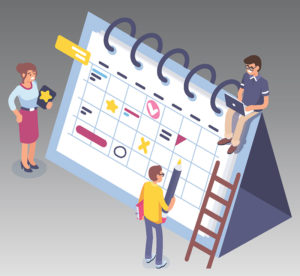Tracking Homework Assignments
Attention Magazine August 2021
“Jack, weren’t you paying attention when the teacher gave your class the assignment? And it’s all on the website, anyway. Did you check the web portal?”
 DOES THIS SOUND FAMILIAR? For many students with ADHD, keeping track of assignments, and getting them completed and turned in—especially on time—can be challenging. This is true under normal circumstances. With the COVID-19 pandemic, some individuals with ADHD may have thrived, while a large number struggled even more with completing schoolwork and homework assignments. Understanding why this pattern occurs can help you identify and implement strategies that more effectively assist your child or teenager with getting their schoolwork completed.
DOES THIS SOUND FAMILIAR? For many students with ADHD, keeping track of assignments, and getting them completed and turned in—especially on time—can be challenging. This is true under normal circumstances. With the COVID-19 pandemic, some individuals with ADHD may have thrived, while a large number struggled even more with completing schoolwork and homework assignments. Understanding why this pattern occurs can help you identify and implement strategies that more effectively assist your child or teenager with getting their schoolwork completed.
If you consider the executive function skills involved in completing assignments under typical circumstances, the student must pay attention in class when tasks or directions are provided. In many instances, teachers post assignments in a school portal as well, or expect students to look there without mentioning them during class. In either situation, the student has to take the steps to follow through in opening up the portal itself, sifting through what is likely a lot of visual information to process, and finding the right place where the assignments are listed.
In some portals, kids have to view tasks only by class. Clicking through six classes’ worth of assignments can be time-consuming and lead to students not following through in viewing everything. Or they may accidentally skip over assignments. Once the students identify what assignments they have to complete, their next challenge often becomes either writing down the assignment somewhere, continuing to go back to the portal to view it, or effectively holding the task in their memory until it is completed (which is often not the best strategy to use anyway).
Assuming your child or teen knows what assignments they need to complete, getting started is sometimes one of the hardest tasks involved in doing homework. Procrastination, not setting aside homework time, avoidance of tasks they perceive as difficult or as tough, or not being sure how to get started, complicate the student’s ability to get moving on completing assignments. Other key issues along the way include getting distracted and stopping, forgetting to go back and finish assignments later, and even completing the assignments but forgetting to submit them online or in-person.
Needless to say, under typical circumstances, these issues can significantly impede a student’s ability to complete assignments, especially when ADHD symptoms interfere. With the COVID-19 pandemic, changing schedules, inconsistencies in expectations, more flexibility with due dates anxiety about pandemic-related issues, social isolation, and many other aspects of the situation exacerbated pre-existing issues with school. Additionally, the pandemic led to increased reliance on executive function skills. At times these skills were taxed to the limit, especially as students had to keep track of classwork and homework assignments that were not completed and submitted in-person.
Nevertheless, by identifying and implementing specific strategies, students can take better control over tracking and completing their assignments, during and beyond the current pandemic.
Whatever the situation might be as schools reopen this fall, here are some practical strategies and tools that you can customize to meet the needs of your own child or teen. As the next school year approaches, we hope that these will help your student get off to a good start by more effectively keeping track of and completing their assignments.
1Help your student to develop a solid system for tracking assignments such as a planner or calendar.
A student cannot complete assignments if they do not know which ones they are expected to complete. For some students, an online portal may serve as this resource if it is accurate 100% of the time. For some students, though, it can be helpful to keep a complete list of all tasks separately from an automated portal, because it gives them the ability to view all tasks in a format they are comfortable with.
A few ideas for a comprehensive list of assignments include:
- Added to an electronic calendar such as Google or Apple Calendar. Many homework portals allow students to sync assignments to an electronic calendar so they do not have to add assignments themselves unless tasks are not already added by teachers.
- Typed in a Google Doc.
- Recorded in an electronic homework planner such as MyHomework or My Study Life.
- Added to an electronic task list such as Google Tasks or Todoist.
- Written out by hand in a paper planner or in a notebook designated for this purpose.
2Help your student create a realistic daily and weekly plan.
Once students have a clear understanding of their assignments, it is often helpful if they map out a plan and put it in a visual format instead of just in their head. A parent may need to assist them with this. This includes breaking down larger assignments into parts or chunks.
Other ideas related to making a plan include:
- List assignments due today or tomorrow first.
- Add other assignments or parts of assignments that would make sense to work on or complete.
- Estimate completion time for assignments.
3Help your child or teen master some basic principles of planning. This can make the difference between the student’s using a system or feeling like no system is actually going to work.
Here are a few of the more common and important principles of planning:
- Estimate completion times. This is important because otherwise if one makes a plan and it is not realistic, it will be impossible to follow it in the time available for completing assignments. This pattern also often fuels the notion that plans don’t work.
- Having flexibility is important. While trying to stick to a plan, also recognizing that sometimes things take longer than planned, unexpected assignments come up, or events occur that impede homework time, and managing these items so as not to completely derail a plan is often vital to its success.
- Block out specific time for homework in general. If a student simply tries to fill some of the time available between school and afterschool activities, they may end up with enough time allotted for homework if they can motivate themselves to get started soon enough in the day. Alternatively, without allotting specific time to do homework, planning is more difficult, and a student is less likely to get assigned work completed on time.
4Setting up an ideal workspace is important for completing schoolwork and homework assignments.
If the student can have a space solely dedicated to schoolwork, that often helps maintain the school mindset. Other ideas related to this include:
- Pick a place with minimal distractions.

- Use noise-cancelling headphones or a white noise machine if there are unavoidable distracting sounds.
- Minimize electronic distractions. Keep phone away from the student’s work area and use electronic programs to block access to websites and games that can be tempting to access during school or study time (such as Freedom, Cold Turkey, Forrest).
- Harness fidgeting by using items such as a wobble cushion/chair, yoga ball chair, desk bike or elliptical, kick bands, hand fidgets, or other items that can be used mindlessly without taking visual focus away from the tasks at hand.
5Use available notification systems and tools to get the reminders your student needs for successfully completing and turning in assignments.
Some ideas include:
- Google Calendar
- Alexa, Google Home, or another personal assistant
- Time Timer for visualizing time remaining
 Carey A. Heller, PsyD, is a licensed psychologist based in Maryland. He specializes in the evaluation and treatment of ADHD and executive function issues. Learn more at hellerpsychologygroup.com. The coordinator for the Montgomery County chapter of CHADD, Dr. Heller also serves as co-chair of the editorial advisory board for Attention magazine.
Carey A. Heller, PsyD, is a licensed psychologist based in Maryland. He specializes in the evaluation and treatment of ADHD and executive function issues. Learn more at hellerpsychologygroup.com. The coordinator for the Montgomery County chapter of CHADD, Dr. Heller also serves as co-chair of the editorial advisory board for Attention magazine.


